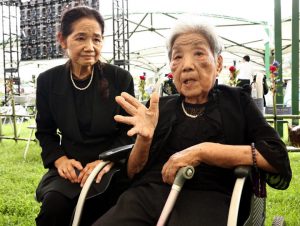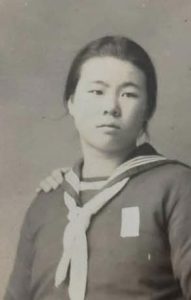Striving to fill voids in Hiroshima 77 years after A-bombing―Ms. Suzuki from Kanagawa, oldest bereaved family representative, ponders significance of life
Aug. 7, 2022
Ms. Suzuki yearns for sister, exposed to residual radiation upon entering city after A-bombing, and passes on sister’s experience with daughter
Seventy years later, name of Ms. Taji, who passed away at 31, finally added to register of A-bomb victims
by Luan Xiaoyu, Staff Writer
On August 6, the date of the atomic bombing of Hiroshima, memorial ceremonies were held in numerous places in the city, at which bereaved families and members of the public paused to remember those whose lives were taken by a single bomb. As fewer and fewer people know about that tragedy 77 years ago, international tensions surrounding nuclear weapons are growing. Each of the participants in the ceremonies was able to renew their commitment that now is the time to pass on the memories of the atomic bombing of Hiroshima.
Ikue Suzuki, 95, an A-bomb survivor and representative of bereaved families in Kanagawa Prefecture who lives in Zama City, attended the Hiroshima Peace Memorial Ceremony for the first time. She yearned for her sister, Momoe Taji, who was exposed to residual radiation when she entered Hiroshima to search for Ikue shortly after the atomic bombing and died in 1953 at the age of 31. Because Momoe passed away at a young age she was not able to obtain an Atomic Bomb Survivor’s Certificate. Early this year, Ikue learned that even the names of people that did not have a certificate would be added to the register of A-bomb victims. For that reason, in June, she reported her sister’s name to the Hiroshima City government. She wonders whether she “was able to live this long for the both of us.” Having Momoe’s name added to the register 70 years later made her once again yearn for her compassionate sister.
At the beginning of the ceremony, Ikue watched in silence as the register of the A-bomb victims, to which her sister’s name had been added, was placed in a stone chest beneath the Cenotaph for the A-bomb Victims. She has always believed her sister died in her stead. Ikue said, “I’m relieved to finally be able to console the soul of my sister. I wondered if perhaps yesterday’s rain was the tears of my sister, who was finally put at ease.” Nodding next to her was Midori Yamamoto, 68, Ikue’s daughter, who attended the ceremony together with her mother.
Momoe was born the third daughter of eight siblings in Sera-cho, a town located in Hiroshima Prefecture. She was a stalwart individual who supported the family in the place of her mother, who had died at a young age. On August 10, 1945, she was exposed to residual radiation in the wake of the atomic bombing when entering the city to search for Ikue, who at the time had been serving as a student nurse at the Hiroshima Red Cross Hospital, located in the area of Senda-machi (now part of the city’s Naka Ward).
Ikue experienced the flash from the atomic bombing in a corner of a student dormitory, located about 1.5 kilometers from the hypocenter. Covered in blood, she crawled out from the collapsed building, thus escaping death. Ikue somehow managed to reach her parents’ house in the town of Sera-cho, where Momoe took care of her with great devotion. Eight years later, however, Momoe passed away after developing both liver and kidney cancers. Any causal relationship between her fatal illnesses and her entrance into the city in the aftermath of the bombing is not clear. The issuance of the A-Bomb Survivor’s Certificates based on the former Atomic Bomb Medical Relief Law began in 1957, four years after Momoe’s death.
This year, Ikue became the oldest bereaved family representative. Little by little, she has been telling Midori, with whom she lives, about her experience in the atomic bombing and about the last years of Momoe’s life, as part of her “obligation of those who were left behind.” She talked about how Momoe had visited her after Ikue had given birth to Midori and her memories of their riding bicycles together.
Carrying on Ikue’s ideas and feelings, Midori began to share her Ikue’s A-bombing experience with elementary school students in her neighborhood. “I want to know more about how my aunt, herself an A-bomb survivor, lived her life,” she said. “It is my responsibility to engrave in my memory proof that my aunt had lived and pass on that evidence to future generations.” With that, she said she feels a new sense of mission.
(Originally published on August 7, 2022)









